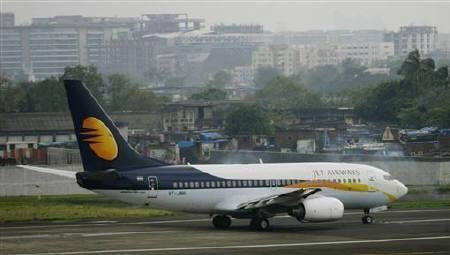Jet Airways’ Record High Quarterly Loss Puts Indian Aviation Sector Troubles Under Spotlight

Jet Airways (India) Limited (NSE:JETAIRWAYS) registered its highest ever quarterly loss of 8.91 billion rupees ($144.69 million) in the September quarter, putting a spotlight on the Indian aviation sector's troubles, which include rising fuel costs exacerbated by a weak domestic currency, falling demand and growing competition, all of which have forced local airlines to resort to heavily discounted fares.
Jet Airways, India’s second-biggest carrier by domestic market share, has been posting losses for the past six years even as it prepares to sell a 24 percent stake to Abu Dhabi’s Etihad Airways for $334 million, subject to final approval from regulators. The deal is expected to provide Mumbai-based Jet with some liquidity and break out of a loss-making business cycle.
“Indian aviation Industry witnessed increasing cost challenges, mainly due to Rupee depreciation against US Dollar, high fuel prices and increase in airport charges in certain stations putting pressure on the bottom line,” Gary Toomey, Jet Airways CEO, said in a statement.
SpiceJet Limited (BOM:500285), which rivals Jet Airways in the Indian market and on some overseas routes, is also expected to post a loss to the tune of $70 million to $80 million in the September quarter, while other carriers such as IndiGo and GoAir also incurred heavy losses, Sydney-based CAPA Centre for Aviation, an industry consultant, said in a report on Wednesday.
“India’s airlines continue to face the dual challenge of a hostile cost environment and soft yields,” the report said. “And the market environment is one in which airlines have a tendency to initiate loss leader pricing during low seasons to generate cash. The nation’s carriers unfortunately repeatedly demonstrated their ability to undo months of hard work with just a few weeks of irrational pricing, as a result of which profitability remains elusive.”
“Both Jet and SpiceJet may be headed for large full year losses for FY14 before accounting for one-off adjustments such as sale-and-leaseback and other non-operating income and benefits,” the report said, adding that Jet Airways is set to receive $150 million from the sale of equity in its loyalty program, as well as sale-and-leaseback income on Boeing 737 deliveries.
The airline also has some additional funds coming its way from the sale of a stake to Etihad, the first investment by a foreign carrier since the Indian government relaxed foreign direct investment rules in the country's aviation sector, and this could result in a reduction in interest costs for Jet Airways by helping to pay down debt.
The report noted that, despite the sector opening up to foreign airlines, investors would be hesitant to pour cash into Indian airlines because the influx of cash would merely be funding losses rather than spurring growth, leading expansion plans to increasingly rely on debt capital. Several carriers are desperate enough to depend on short-term financing from travel agents at very high interest rates -- a troubling sign indicating the extent of their difficulties, the report added.
“A further one or two quarters similar to the one just completed could test the holding power of some airlines,” the report said.
Meanwhile, India’s aviation regulator, Directorate General of Civil Aviation, or DGCA, will study the impact on air fares of allowing the Airbus A380, the world’s largest passenger jet, to operate in the domestic air space, amid pending requests from several foreign airlines for regulatory approval to fly the aircraft, Mint, a local business newspaper, reported.
The Airbus A380 currently does not have permission to fly in and out of India because of concerns that the jet, which can carry as many as 525 passengers, could strain the limited infrastructure available at Indian airports and also increase competition for struggling local carriers that cannot currently afford to operate the massive airplane.
© Copyright IBTimes 2024. All rights reserved.






















